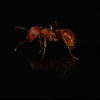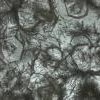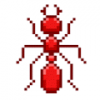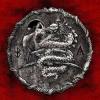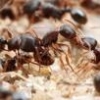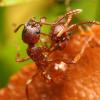Since becoming heavily engaged with the online antkeeping community in late 2013, I have not only strived to be 100% honest about the uses and limitations of the products I design and sell, but also have, in contrast with my shop-owner peers, given away the secret sauce—be it a recipe, design file, or other "intellectual property" that would enable a user with similar time and resources to replicate, for personal use, the work I and others have achieved with far less effort than starting from scratch.
Let's talk about a few of the things that have changed in this community since I began pioneering new ideas back in 2013:
- Days after disclosing the details of a formicarium with a magnetically-held "heated cover," ant shop owners around the world begin integrating magnets into their formicaries in new and fantastic ways.
- Work on Formula Blue 100 results in widespread discussion and critique of ant diets, forcing a local competitor to publicly acknowledge the once closely-kept secret of the ingredients of the food they had been selling for years.
- Roughly a year after being the first to commercialize an entirely 3D-printed formicarium—the iconic GroTube—other shop owners introduce and begin to sell their own 3D-printed formicaries.
- Months after introducing beautiful, naturalistic foraging areas, other shop owners upgrade their existing products with similar, premium decor options.
- Months after first commercially introducing a foraging area with an inset escape-prevention lid to the North American market, other North American shop owners decide to get on the bandwagon and sell nearly identical products.
- Months after publicly releasing the 3D files of the GUZZLER Liquid Feeder—another much-loved original invention—shop owners in Europe begin selling extraordinarily similar designs.
- Honey, sugar water, maple syrup—which is better? SUNBURST Ant Nectar eliminates the confusion and provides a 100% reliable method of feeding carbohydrates and electrolytes to ants. No shop has marketed an ant food product with such an unimpeachable promise before.
- What is the best way to keep ants from escaping? byFormica Fluon Markers are introduced to completely eliminate the guesswork out of applying an effective escape prevention barrier.
Effective immediately, I (as owner of byFormica Ant Products) will join the ranks of ant shop owners around the world who have shunned giving detailed replies when being asked about the secret sauce of their ant foods, accessories, and formicarium designs. Why? Because disclosing predigested research and development to the cheapest customers and shrewdest shop owners has never sold anything. In fact, it's a recipe for disaster:
The idea all along was that by sharing the work I have done, referencing the scientific papers of interest that I and others have found useful, and answering questions candidly and openly, the online ant community would flourish as others would critique and build upon that pre-existing work. In return, I could commercialize those improvements, selling them to anyone who could afford them—and not just those with the abundance of expensive tools and DIY skills needed to build them from scratch.
To those ends, I started a wiki nearly a year ago, with the hope of inviting others in the online ant community to participate in the process of describing in detail exactly how ant products are developed. Over the course of nearly one year, the number of outside contributions to the wiki totaled exactly zero, compared to the 200+ articles I personally wrote and edited. Indeed, in making such research so easily available, the only people to have benefited—by all appearances—were other shop owners with superior resources in the art of selling things, and far less time to give away how-to guides for how to obtain their products for free.
So, while some critics may feel that I overstate the influence I've purported to have had in the online ant community over these past two years—and they may to some extent be right—the frequency and seemingly convergent evolution of others commercializing the same or similar products or product ideas almost immediately after me, as far as I, as a shop owner am concerned, are far too numerous and deafening a coincidence to ignore.
Through my personal experiences and observations these past two years, it has become painfully clear that other shop owners—all of whom couldn't care less about the success or failure of one another—have the right idea. It is a sad and unfortunate reality that patents, trade secrets, high prices, and skimpy details are the things that build a successful ant business in a community of penny pinchers and high customer scarcity. In the end, when other shop owners can benefit in any way from your R&D, rather than being a contest of who should receive due credit for a product or invention—or even who has the highest quality product—success becomes a contest of who can sell their product better—either by competing on price, or by exploiting pre-existing customer loyalties in a small, closely-knit online community.
Most ant products are made in low volume, by hand, and often by the shop owner him or herself. Those who compete on price will lose as a matter of well-established economics—there aren't enough antkeepers, or demand, in domestic markets to justify low profit margins. Ant products tend to be relatively inelastic, meaning that the price has little influence on whether they will sell. When a shop owner can spend 100 hours making 100 products at $30 profit per sale, thereby making $30 an hour; or one can spend 200 hours selling 200 products at a profit of $5 per sale, thereby making $5 an hour—it's abundantly clear which is the better choice for one's limited time.
And so, as anyone who is the least familiar with the online ant community can acknowledge, the winners become those who can create a product and community ecosystem—a one-stop-shop, where customers needn't look elsewhere for either ant products or ant care information or advice, and where the existence of other shops and communities isn't even acknowledged. In many of these communities, it is forbidden to even discuss other shops, products, or communities that directly compete with the shop owner's interests. How does this help anyone other than the shop owner?
All of the above ramblings lead me to announce that the latest version of the GroTube will be my final public release. In a matter of days, I'll publish the files on Thingiverse.com, and will sell accessory kits to allow anyone with a capable 3D printer to be able to manufacture the formicarium for just a few bucks.
This message is a simple word of warning for any would-be idealist who thinks they have great ideas, or anyone who might enter this industry thinking they can hold hands and sing kum ba yah with other well-meaning hobbyists—people like
dspdrew
, who has his own aspirations to sell ant products one day. People will be inspired by what you do. And so, your success or failure in this business has little to do with the quantity of your contributions, or the quality of your products—and everything to do with who you can convince to buy your stuff, and how many rabid fans you can create to boycott your competitors.
Edited by drtrmiller, February 6 2016 - 3:16 PM.



